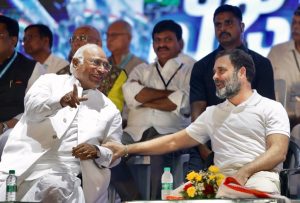At a press conference in New Delhi earlier this week, the opposition Congress party’s media spokesperson Pawan Khera described Prime Minister Narendra Modi as the “Congress party’s star campaigner.” Khera pointed out how Modi, in his recent 55-minute speech in election-bound Madhya Pradesh, “mentioned Congress 44 times!” The Congress party’s victories in the states of Karnataka and Himachal Pradesh, Khera said, prove that wherever Modi campaigned intensively, it benefitted the Congress.
There is a new-found aggression in the Congress party — a far cry from its situation over the past decade when it has resembled a rudderless ship stumbling from one poll debacle to another.
Elections to five state assemblies are upcoming, and the Congress seems to be more battle-ready than it has ever been in the past 10 years.
Former party President Rahul Gandhi exuded confidence in a Congress victory in the upcoming assembly elections. “We are certainly winning Madhya Pradesh and Chhattisgarh, Rajasthan we are very close. We are probably winning Telangana,” Gandhi said at a media conclave this week.
For a party that was dismissed as a spent force, with Modi urging voters to ensure there is a “Congress-mukt Bharat” (a Congress-free India), this is a significant turnaround.
Unlike its lackadaisical attitude in the run-up to the 2019 general elections, the Congress has already started charting out a clear road map for the 2024 polls slated for April-May next year.
At the crucial Congress Working Committee (CWC) meeting in Hyderabad earlier this month, the party in its official resolution highlighted the erosion of democratic institutions in the country and resolved to do everything to oust the BJP in 2024. It resolved to fight the elections unitedly with other opposition parties as part of the INDIA alliance “to free the country from [the BJP’s] divisive politics.”
A critical role in the Congress’ resurgence belongs to 81-year-old Mallikarjun Kharge. Kharge completes a year as the party’s president next month. In an earlier article, I wrote about the multiple challenges that Kharge faced as the Congress president, including the party’s existential crisis and deep-seated factionalism. So far, he has risen to the challenge.
The octogenarian’s administrative acumen has been severely tested in the past few months. He managed to broker a truce in poll-bound Rajasthan between incumbent Chief Minister Ashok Gehlot and the young challenger Sachin Pilot.
A senior Congress leader, who did not want to be named, told The Diplomat that “Kharge has managed to address the apprehensions of both, the ‘old guard’ and the aspirations of the ‘young guns.’ He has managed the generational shift within the party, with the least resistance.”
Kharge’s imprint on the party can be seen in the newly-appointed members of the CWC. Young and old leaders have found a place in the committee.
Several disgruntled Congress seniors, who were part of the rebel G23 (Group of 23), have been included in the CWC. Pilot, whose feud with Gehlot has been playing out in the open, has been placated with CWC membership. Even diplomat-turned-politician Shashi Tharoor, who contested against Kharge for the post of party president, has been included in the CWC.
Significantly, since Kharge took over the reins, the Congress has won two major state assembly elections; it ousted the BJP from Himachal Pradesh in the north and Karnataka in the south.
With the issue of the long-pending “leadership vacuum” in the party being settled, there appears to be a sense of purpose and aggressiveness in the Congress rank and file. Most importantly, the experienced Kharge and the younger Rahul Gandhi share a good working relationship. This was evident during Gandhi’s long march, the Bharat Jodo Yatra. Kharge ably supported Gandhi’s countrywide march, which helped to reconnect the public with the Congress as well as enthuse party cadres.
What the Congress has also realized is the need to offer an “alternative narrative” that appeals to voters and not merely resort to BJP bashing if it intends to defeat the BJP in 2024.
Over the past ten years, the Congress has been grappling with how to counter the BJP’s championing of Hindu majoritarianism. The BJP’s overwhelming victories in the 2014 and 2019 general elections can be attributed to its consolidation of Hindu votes.
Of late, the Congress has started championing the cause of Other Backward Classes (OBC) voters, who constitute a hefty 42 percent of population, as a counterweight to the BJP’s Hindu mobilization.
OBCs are constitutionally recognized as socially and economically backward groups. The Congress is demanding adequate representation for OBCs in governance.
The possibility of unseating the BJP by denting its Hindutva vote bank has put the wind back in the Congress’ sails.
Incidentally, several of the major constituents of the INDIA alliance — the Samajwadi Party, the Rashtriya Janata Dal, Janata Dal-United, and the Dravida Munetra Kazhagam — are parties that champion OBC empowerment.
Therefore, during the recent special session of Parliament, when the BJP sprung a surprise on the opposition by bringing in the Women Reservation Bill, the Congress and other INDIA bloc parties extended support to the bill but also demanded a separate quota for OBC women.
The bill was “incomplete” without OBC reservation, Gandhi said. The bill provides for the reservation of 33 percent of seats in Parliament and state assemblies for women. In his speech in Parliament, Gandhi demanded a caste census that would provide a more accurate estimation of the numbers of various caste groups to ensure more equitable social justice.
It is becoming evident that the BJP’s politics of polarization and jingoistic nationalism have somewhat lost their sheen. But can the Congress and the INDIA bloc cash in on it and dislodge the well-entrenched BJP?
Much will depend on the results of the five states going to elections by the end of the year, which would be a definitive curtain raiser, indicating the pulse of the electorate in the run-up to 2024.

































